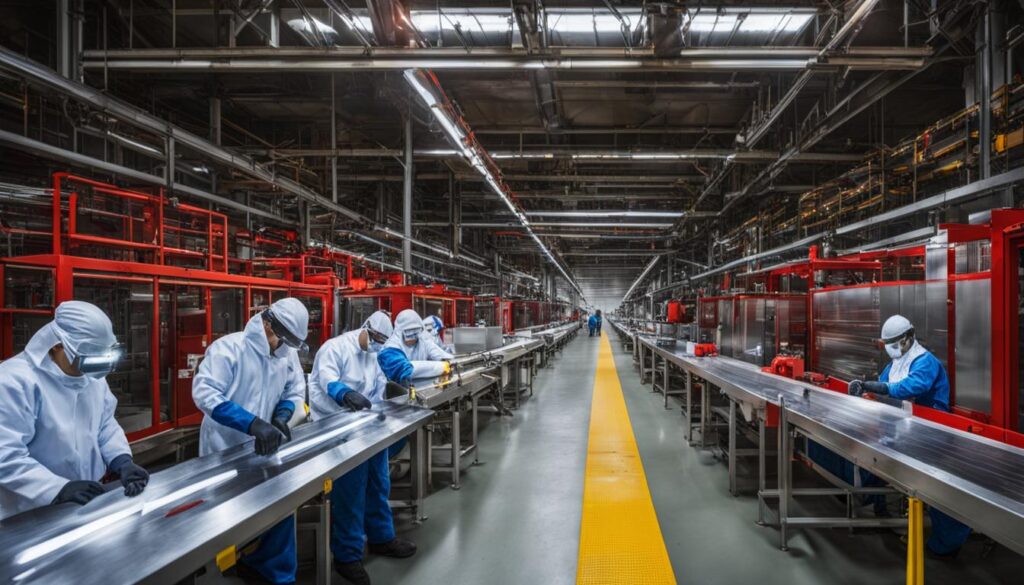Elevating Industry Standards with GMP Registration: A US Focus
At [Our Company], we understand the importance of maintaining high industry standards and ensuring the safety and quality of pharmaceutical products. That's why we are proud to offer GMP registration services to manufacturers in the United States. GMP, or Good Manufacturing Practice, certification goes beyond mere compliance with FDA standards. It is a commitment to excellence, continuous improvement, and regulatory compliance.
With GMP certification, manufacturers can elevate their operations, enhance product quality, and increase customer trust. It involves assessing current manufacturing practices, implementing necessary changes, and undergoing an audit by a certification body. At [Our Company], we guide manufacturers through the entire GMP certification process, helping them meet the stringent requirements and gain industry accreditation.
Key Takeaways:
- Elevating industry standards with GMP registration showcases a commitment to continuous improvement and regulatory compliance.
- GMP certification enhances product quality, improves efficiency, and increases customer trust.
- The GMP certification process involves assessing current manufacturing practices, implementing necessary changes, and undergoing an audit.
- Manufacturers must meet specific requirements related to facility and equipment, personnel, documentation, and quality control to obtain GMP certification.
- Preparing for GMP certification requires thorough planning, training, and implementation of necessary changes.
Understanding GMP Certification in Manufacturing
GMP certification is a globally recognized standard that sets guidelines for manufacturing drugs and health products. It ensures that products are made under controlled conditions and with consistent quality. GMP certification is essential for manufacturers who want to ensure the safety, quality, and consistency of their products. It helps minimize the risk of product recalls, customer complaints, and regulatory penalties. GMP certification also demonstrates a commitment to compliance and regulatory requirements, enhancing brand reputation and opening doors to new markets.
GMP certification is built on manufacturing best practices and quality assurance principles. It requires manufacturers to establish and maintain robust quality management systems, ensuring that every aspect of the manufacturing process meets the highest standards. From raw material sourcing and handling to production and quality control, GMP certification covers all critical areas to ensure the integrity of the final product.
By obtaining GMP certification, manufacturers can enhance their credibility and gain a competitive edge in the industry. It not only improves the overall quality of their products but also instills confidence in customers and stakeholders. GMP-certified manufacturers are seen as industry leaders and trusted partners, as they have demonstrated their commitment to upholding the highest manufacturing standards.
Ensuring compliance with GMP standards requires ongoing effort and dedication. Manufacturers must continually review and update their procedures, implement robust quality control measures, and conduct regular internal audits. By adhering to GMP certification requirements, manufacturers can ensure the safety, effectiveness, and quality of their products, setting a benchmark for excellence in the industry.
Benefits of GMP Certification in Manufacturing:
- Enhanced product quality and safety
- Minimized risk of product recalls and regulatory penalties
- Improved reputation and credibility
- Access to new markets and business opportunities
- Increased customer trust and satisfaction
Key Elements of GMP Certification:
| Facility and Equipment | Personnel | Documentation and Records | Quality Control |
|---|---|---|---|
| Manufacturing facility meets necessary standards | Qualified and trained employees | Accurate documentation and records management | Comprehensive quality control measures |
| Controlled environment and equipment validation | Proper training and ongoing development | Batch records and traceability | Sampling and testing procedures |
| Cleaning and sanitation procedures | Training records and qualifications | Change control and deviation management | Product release and stability testing |
GMP Certification Process: Ensuring Compliance and Audit
GMP certification is a crucial step for manufacturers to ensure compliance with Good Manufacturing Practice guidelines. The certification process involves several key steps that aim to assess and improve manufacturing practices, culminating in an audit to verify compliance. Let's take a closer look at the GMP certification process and its importance.
GMP Certification Process Steps
- 1. Initial Assessment: Manufacturers conduct an assessment of their current manufacturing practices, identifying areas for improvement.
- 2. Implementing Changes: Necessary changes are implemented to align with GMP standards and improve overall product quality and safety.
- 3. Certification Body Audit: A certification body conducts an audit to assess compliance with GMP requirements and verify that all necessary changes have been made.
During the audit, the certification body thoroughly reviews documentation, processes, and procedures to ensure they meet GMP standards. This includes assessing manufacturing facilities, equipment, personnel qualifications, and quality control measures.
Importance of Compliance and Audit
“GMP certification ensures that manufacturers adhere to strict guidelines, promoting product safety and quality. It demonstrates a commitment to regulatory compliance and continuous improvement.”
– GMP Expert
Compliance with GMP standards is vital for manufacturers who want to maintain product integrity, minimize risks, and build customer trust. By going through the certification process and undergoing regular audits, manufacturers can identify and address any areas of non-compliance, ensuring that their products meet the highest quality standards.
In conclusion, the GMP certification process plays a crucial role in ensuring compliance with Good Manufacturing Practice guidelines. By following the steps of initial assessment, implementing necessary changes, and undergoing a thorough audit, manufacturers can demonstrate their commitment to product safety, quality, and regulatory compliance. GMP certification serves as a benchmark for excellence and helps manufacturers gain a competitive edge in the industry.

GMP Certification Requirements
GMP certification requires manufacturers to meet specific requirements to ensure the safety, quality, and integrity of their products. These requirements cover various aspects of manufacturing, including facility and equipment, personnel, documentation and records, and quality control.
Facility and Equipment
To obtain GMP certification, manufacturers must have suitable facilities and equipment that meet the necessary standards for product safety and quality. This includes having controlled manufacturing environments, adequate storage areas, and well-maintained equipment. The facilities should be designed to prevent contamination and ensure the proper handling and storage of materials.
Personnel
The GMP certification requirements also focus on personnel, emphasizing the need for trained and qualified individuals who understand the importance of GMP principles. Manufacturers must ensure that their employees have the necessary knowledge and skills to maintain compliance with GMP standards. This includes providing appropriate training, conducting regular performance evaluations, and implementing measures to prevent contamination or errors caused by human factors.
Documentation and Records
Accurate and comprehensive documentation and record-keeping are essential for GMP certification. Manufacturers must maintain detailed records of their manufacturing processes, including batch records, quality control tests, and product specifications. These documents provide evidence of compliance with GMP standards and serve as a reference for regulatory inspections and audits.
Quality Control
GMP certification requires manufacturers to establish robust quality control measures to ensure that their products consistently meet the required standards. This includes implementing quality control procedures, conducting regular testing and analysis, and documenting any deviations or corrective actions. By closely monitoring the manufacturing process and product quality, manufacturers can identify and resolve any issues that may affect the safety or efficacy of their products.
| Requirement | Description |
|---|---|
| Facility and Equipment | Suitable facilities and well-maintained equipment |
| Personnel | Trained and qualified personnel |
| Documentation and Records | Accurate and comprehensive documentation |
| Quality Control | Robust quality control measures |
Meeting these GMP certification requirements demonstrates a commitment to maintaining high standards of quality, safety, and regulatory compliance. It allows manufacturers to enhance their reputation, gain customer trust, and access new markets where GMP certification is a prerequisite for doing business.
Preparing for GMP Certification
Preparing for GMP certification is a crucial step in elevating industry standards and ensuring compliance with Good Manufacturing Practice guidelines. To navigate the certification process successfully, manufacturers must undertake several key tasks:
- Performing a thorough gap analysis to identify areas of improvement and non-compliance with GMP requirements.
- Developing a comprehensive implementation plan that outlines specific actions, assigns responsibilities, and sets realistic timelines.
- Providing adequate training to all staff members on GMP principles, regulations, and procedures to ensure a unified understanding and commitment to compliance.
- Updating and documenting standard operating procedures (SOPs) to align with GMP standards and practices.
Conducting internal audits is another critical aspect of preparing for GMP certification. These audits allow manufacturers to assess their readiness, identify any remaining gaps, and take corrective actions before the formal certification audit. Additionally, maintaining detailed documentation throughout the entire process is essential. This documentation should include training records, SOP revisions, implementation progress, and any other relevant information required for the certification audit.
By following these steps and investing time and effort into thorough preparation, manufacturers can increase their chances of a successful GMP certification audit and demonstrate their commitment to delivering safe, high-quality products that meet regulatory standards.
| Task | Description |
|---|---|
| Perform a gap analysis | Identify areas of improvement and non-compliance with GMP requirements. |
| Develop an implementation plan | Create a comprehensive plan with specific actions, responsibilities, and timelines. |
| Provide GMP training | Ensure all staff members receive training on GMP principles, regulations, and procedures. |
| Update SOPs | Revise and document standard operating procedures to align with GMP standards. |
| Conduct internal audits | Assess readiness, identify gaps, and take corrective actions before the formal certification audit. |
| Maintain documentation | Create and keep detailed records of training, SOP revisions, and implementation progress. |
By following these steps and investing time and effort into thorough preparation, manufacturers can increase their chances of a successful GMP certification audit and demonstrate their commitment to delivering safe, high-quality products that meet regulatory standards.
“Thorough preparation is key to successfully obtain GMP certification. Manufacturers must analyze their current practices, develop an implementation plan, provide staff training, update standard operating procedures, conduct internal audits, and maintain detailed documentation. By following these steps, manufacturers can showcase their commitment to compliance and increase their chances of passing the GMP certification audit.”
Common Challenges in Obtaining GMP Certification
Obtaining GMP certification can pose various challenges for manufacturers, requiring careful consideration and strategic planning. We understand the difficulties that arise in the process and have identified common challenges that manufacturers often face:
- Lack of Awareness: Many manufacturers may not be fully aware of the specific requirements and benefits of GMP certification. This lack of knowledge can hinder their ability to effectively prepare and meet the necessary standards.
- Limited Resources: Implementing the changes and improvements necessary to meet GMP requirements can be resource-intensive. Some manufacturers may struggle with limited budgets, personnel, or infrastructure, making it challenging to allocate the necessary resources to achieve certification.
- Resistance to Change: GMP certification often calls for changes to existing manufacturing practices, procedures, and systems. Resistance to change from employees or management can impede progress and hinder the successful implementation of GMP standards.
- Complex Regulatory Landscape: The regulatory framework surrounding GMP certification can be complex and vary across different industries and regions. Navigating and understanding these regulations can be challenging for manufacturers, especially those operating in multiple jurisdictions.
- Maintaining Compliance: GMP certification is not a one-time achievement. Manufacturers must continuously monitor and maintain compliance with GMP standards to retain certification. This ongoing commitment to compliance can be demanding and require dedicated resources and processes.
Overcoming these challenges requires a proactive and informed approach, coupled with a thorough understanding of the GMP certification process.
Table: Common Challenges in Obtaining GMP Certification
| Challenges | Description |
|---|---|
| Lack of Awareness | Manufacturers may have limited knowledge of GMP requirements and the benefits of certification. |
| Limited Resources | Constraints in terms of budget, personnel, or infrastructure that hinder the implementation of necessary changes. |
| Resistance to Change | Employees or management may resist the changes required to comply with GMP standards. |
| Complex Regulatory Landscape | Different regulations and standards across industries and regions can make compliance challenging. |
| Maintaining Compliance | Continuous efforts are required to ensure ongoing compliance with GMP standards after certification is achieved. |
By addressing these challenges head-on and working collaboratively with all stakeholders, manufacturers can successfully navigate the path to GMP certification and elevate their standards of quality, safety, and regulatory compliance.

GMP Certification Audit
Once the necessary preparations are complete, manufacturers must undergo a comprehensive GMP certification audit. This crucial step in the certification process involves a thorough assessment of compliance with GMP standards and the verification of all requirements. During the audit, a certification body will evaluate various aspects of the manufacturing process to ensure that the highest standards of quality, compliance, and documentation are met.
The GMP certification audit focuses on key areas such as facility design and cleanliness, equipment maintenance and calibration, personnel training and qualification, documentation practices, and quality control measures. Compliance with regulatory requirements, including Good Laboratory Practices (GLP) and Good Documentation Practices (GDP), is also evaluated. Any non-compliance identified during the audit must be addressed and rectified before certification can be granted.
To ensure a successful GMP certification audit, manufacturers should conduct internal mock audits to identify potential gaps and areas for improvement. This allows them to address any non-compliance issues beforehand and make necessary adjustments to their processes. Additionally, manufacturers should ensure that all required documentation and records are complete, accurate, and easily accessible during the audit. Preparation is key to a smooth and successful GMP certification audit.
Benefits of a Successful Audit
A successful GMP certification audit brings several benefits to manufacturers. Firstly, it demonstrates a commitment to maintaining high standards of quality, compliance, and customer satisfaction. GMP certification enhances brand reputation and can open doors to new markets and business opportunities. Secondly, it ensures that the manufacturing process follows best practices, reducing the risk of product defects, recalls, and customer complaints. Thirdly, it provides a framework for continuous improvement, giving manufacturers the tools and guidance to consistently enhance their operations and products.
Overall, the GMP certification audit is a crucial step in the journey towards elevated industry standards. By successfully completing the audit and obtaining GMP certification, manufacturers can solidify their commitment to quality, compliance, and customer satisfaction, gaining a competitive edge in the market.
Benefits of GMP Certification in the Cannabis Industry
GMP certification plays a crucial role in ensuring the highest standards of quality, safety, and compliance in the cannabis industry. With the growing legalization and popularity of cannabis products, consumers are demanding assurance that the products they purchase meet stringent quality standards. GMP certification provides that assurance by establishing guidelines for cultivation, extraction, manufacturing, and quality control processes.
By implementing GMP standards, cannabis manufacturers demonstrate their commitment to producing consistent and safe products. This not only helps build trust with consumers but also allows manufacturers to differentiate themselves in the market. GMP certification provides a competitive advantage, as it assures consumers that the products have undergone rigorous quality checks and comply with industry regulations.
“GMP certification is a crucial step in ensuring the safety and quality of cannabis products. It helps manufacturers meet the expectations of regulatory authorities and gain access to new markets.” – Expert in the Cannabis Industry.
GMP Certification: A Catalyst for Quality Standards and Compliance
Obtaining GMP certification in the cannabis industry goes beyond regulatory compliance. It sets a higher standard for quality management systems, ensuring that manufacturers consistently deliver safe and reliable products to consumers. GMP certification requires strict adherence to processes, documentation, and quality control measures, enabling manufacturers to identify and rectify any potential issues before they reach the market.
| Benefits of GMP Certification in the Cannabis Industry | Explanation |
|---|---|
| Enhanced Product Quality | GMP certification ensures that products are manufactured under controlled conditions, leading to consistent quality and potency. |
| Regulatory Compliance | GMP certification demonstrates compliance with industry regulations, reducing the risk of penalties and legal issues. |
| Consumer Trust | GMP certification builds trust with consumers by assuring them that the products meet strict quality and safety standards. |
| Market Access | GMP certification opens doors to new markets, as it is often a requirement for distribution and export of cannabis products. |
GMP certification is an essential investment for cannabis manufacturers looking to establish themselves as industry leaders. It not only ensures compliance with regulatory requirements but also elevates product quality, instills consumer trust, and facilitates market expansion.
Conclusion
Elevating industry standards with GMP registration is essential for manufacturers in various industries, including pharmaceuticals and cannabis. GMP certification sets a benchmark for excellence, demonstrating our commitment to quality, safety, and regulatory compliance. By understanding the GMP certification process, meeting the requirements, and implementing robust quality management systems, we can elevate our operations, enhance product quality, and increase customer satisfaction.
GMP registration goes beyond compliance; it is a testament to our dedication to continuous improvement and industry best practices. Through GMP certification, we can ensure that our products are manufactured under controlled conditions and with consistent quality. This not only minimizes the risk of product recalls, customer complaints, and regulatory penalties but also builds trust and credibility among our customers.
By implementing GMP standards and adhering to Good Manufacturing Practices, we demonstrate our commitment to meeting the highest industry standards. GMP certification provides us with a competitive advantage, as it distinguishes our products from others in the market. It also opens doors to new markets and opportunities, allowing us to expand our reach and grow our business.
With GMP certification, we can elevate industry standards and make a positive impact on the quality and safety of our products. It reinforces our dedication to quality management systems, ensuring that we consistently deliver safe and effective products to our customers. By investing in GMP registration, we strive to exceed customer expectations, enhance our reputation, and contribute to the overall advancement of our industry.
FAQ
What is GMP certification?
GMP certification is a voluntary and stringent process that ensures manufacturers adhere to specific safety and quality guidelines for their products.
Why is GMP certification important in manufacturing?
GMP certification ensures the safety, quality, and consistency of products, minimizing the risk of recalls, complaints, and regulatory penalties. It also demonstrates a commitment to compliance and enhances brand reputation.
What is the GMP certification process?
The GMP certification process involves assessing current manufacturing practices, implementing necessary changes, and undergoing an audit by a certification body.
What are the requirements for GMP certification?
Manufacturers must have suitable facilities and equipment, trained personnel, accurate documentation, robust quality control measures, and procedures for handling complaints and product recalls.
How can manufacturers prepare for GMP certification?
Manufacturers should conduct a gap analysis, develop an implementation plan, train staff, update procedures, implement quality control measures, conduct internal audits, and ensure all necessary documentation and records are in place.
What are the common challenges in obtaining GMP certification?
Common challenges include a lack of awareness of GMP requirements and benefits, limited resources, resistance to change, complex regulatory landscapes, and the ongoing commitment to maintaining compliance.
What happens during a GMP certification audit?
The certification body assesses compliance with GMP standards, verifies requirements have been met, and ensures all necessary documentation and records are in place.
Why is GMP certification important in the cannabis industry?
GMP certification ensures the highest standards of quality, safety, and compliance in the cannabis industry, building consumer trust, differentiating products, and opening doors to new markets.
What are the benefits of GMP certification?
GMP certification elevates industry standards, enhances product quality, improves efficiency, increases customer trust, and demonstrates a commitment to quality, safety, and regulatory compliance.
Source Links
- https://pharmaoffer.com/blog/step-by-step-guide-how-to-apply-for-a-gmp-certificate/
- https://cannabislicenseexperts.com/blog/comprehensive-guide-to-gmp-certification-for-cannabis-businesses-in-the-usa-and-canada/
- https://qualitysmartsolutions.com/blog/everything-you-need-to-know-about-how-to-get-gmp-certification/











Leave a Reply